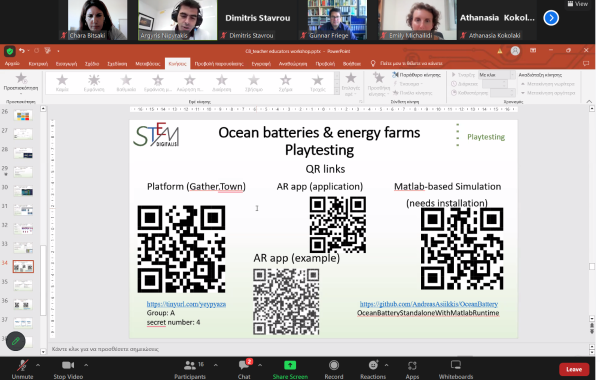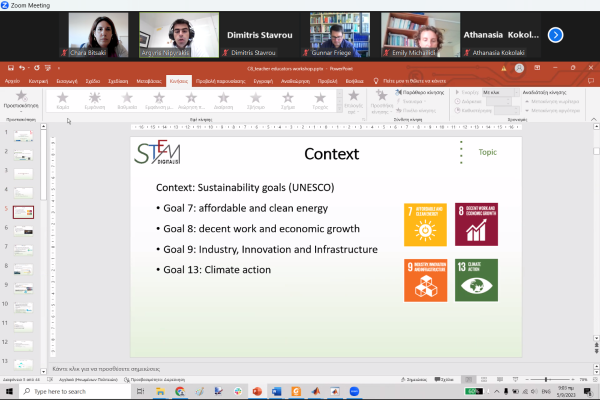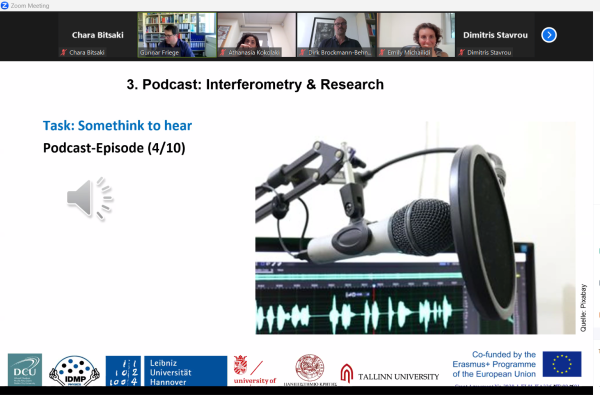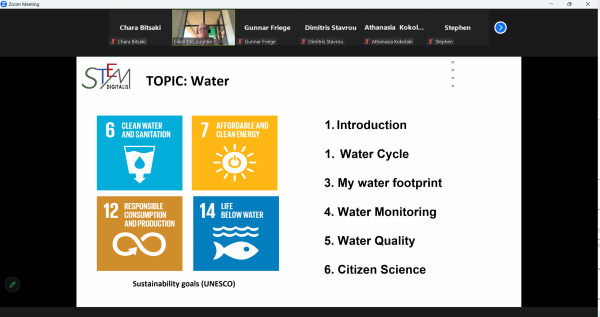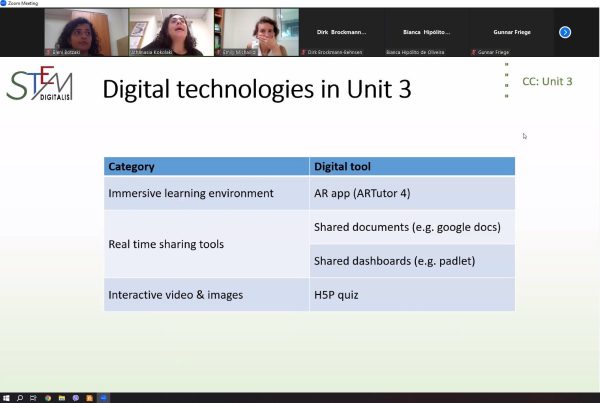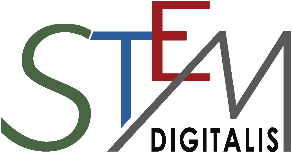ONLINE SHORT JOINT STAFF TRAINING EVENT
5 – 7 September 2023
STEM – DIGITALIS is an Erasmus+ project that aims at designing and developing blended and distance learning environments for teaching prospective science teachers advanced STEM topics. In particular, five STEM digital scenarios have been developed and tested during an international summer school as well as local online implementations in each partner institution as illustrated in the following table:
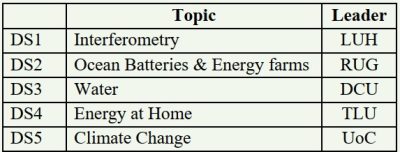
The STEM DIGITALIS partnership organized a 3-day online short joint staff training event that was held from the 5th to the 7th of September 2023 via Zoom Platform. The online training event was addressed to teacher educators, post–doc researchers, early career researchers, Ph.D. students in STEM education, etc., and its aim was to familiarize the participants with innovative teaching approaches and methods regarding both the use of digital tools in STEM teaching and blended teaching methodologies.
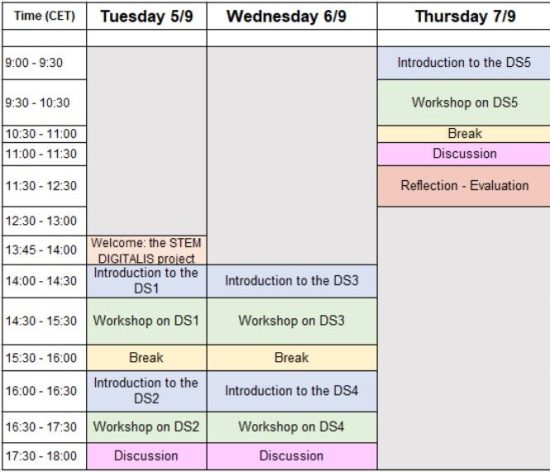
Brief description of the workshops
DS1: Interferometry (Leader: LUH)
Interferometry is an important field in physics. It is used intensively and in many ways in physics research. Interferometric methods are also used in measuring instruments and thus in development and industry. In school, interferometry is covered in the upper grades. It is therefore an advanced STEM topic for school, research, and application. In our scenario, interferometry will be taught at the school level and insights will be given into the use of interferometric experiments in current research at Leibniz Universität Hannover. The focus is on a virtual reality environment where learners can perform and evaluate two different experiments with a Michelson interferometer. In addition, various digital tools were developed, such as a podcast series with researchers, interactive screen experiments on different types of interferometers, GeoGebra simulations or silent videos as a special method for teaching physics. In the introduction, we gave an overview of the interferometry unit and introduced the basics of the field. In the workshop, the digital tools were presented and tested.
DS2: Ocean Batteries and Energy farms (Leader: RUG)
Research and development on alternative energy sources has been proposed as a way to address the energy crisis and mitigate climate change. However, the supply of energy produced from alternative energy sources is not stable, which creates the need to develop advanced and eco-friendly energy storage technologies. In this light, the STEM Digitalis RUG module has developed a digital scenario on Ocean Batteries and Energy farms, based on an innovative start-up project (https://oceangrazer.com/) nested within the University of Groningen. In this digital scenario, you will experience a) the main rationale of this innovative and eco-sustainable technology, and its educational significance for STEM Education contexts, b) the digital technologies implemented for STEM teaching, such as virtual platforms, AR assistants, engineering simulations, as well as educational platforms, c) the pedagogical strategies, such as game-based learning and problem-based learning, which were used for the development and implementation of the scenario, and d) research and design principles implemented for the development and evaluation of the digital scenario.
DS3: Water (Leader: DCU)
Sustainable water means a nation can be water self-sufficient: ensuring there is enough water to meet multiple needs, from agriculture to municipal and industrial. It also means that every citizen’s water supply will remain consistent, despite climate change impacts, such as a lack of rainfall and drought, or too much rain, and being flood resilient. Water sustainability can also mean energy neutrality by coupling traditional water treatment technologies with renewable energies. This topic is very important in STEM education as over 71% of the Earth’s surface is water covered and less than 3.5% of the water on Earth’s surface is fresh water – of which over 68% is locked up in ice and glaciers, over 30% is inaccessible as groundwater and less than 2% is accessible freshwater. The STEM Digitalis digital scenario developed by Dublin City University has three units that focus on developing an understanding of a) water conservation and the water cycle; b) an individual’s water footprint and responsibilities of water conservation; c) water monitoring and data analysis and d) the role of citizen science in water education. This module illustrates how scientists can co-create citizen science programmes by collaborating with community-based groups to generate more data in a specific area of interest such as water quality, thus progressing SDG 6 – Clean Water & Sanitation.
DS4: Energy at home (Leader: TLU)
The development of technology has led to a continuous decrease in the energy consumption of different devices. At the same time, the number and variety of such devices per one person, family, and household have increased drastically. Apparently, this is one of the reasons why the energy consumption of all mankind continually increases. But we can consider a more personal economical point of view. For all the energy consumption we should pay. If the cost of energy from our everyday energy sources rises, one needs to find ways to save energy and introduce independent energy sources. In our scenario, we analyze what may be the main energy outgoings in a household, and how to find the possibilities for the economy of energy. For this, we look closely at what are the main energy-consuming devices or absorbers in an individual household, e.g., electrical devices and heating in Estonia, conditioning in southern Europe, etc. We study how energy consumption is divided into different parts and how to save it. Also, we study what savings can be made using so-called alternative energy sources such as solar panels. As a model system, we consider the individual household which allows us to find more different ways to discuss energy consumption and the economy. Therefore one should consider that not all the discussed ways are used e.g. in apartment buildings.
DS5: Climate Change (Leader: UoC)
The rapid climate change that is observed during the last century, has important impacts on the natural environment, threatening the biodiversity and survival of ecosystems as well as human societies, affecting health and economies. Key leverage point to achieve the goal of citizens’ climate literacy is climate education that may equip citizens with knowledge on climate change causes, consequences, and mitigation-adaptation measures. The digital teaching scenario of climate change, developed by the University of Crete, consists of 3 units that focus on (i) drivers of climate change, (ii) carbon emissions generated by anthropogenic activities and mitigation measures taken regarding renewable sources of energy and (iii) the negotiation of a socioscientific issue regarding the lignite phase out to meet EU goals for climate neutrality. In order to cover these aspects of climate change diverse digital tools have been used such as: Unity 3D, mobile apps, H5P, online communication and collaboration tools. During the workshop participants experienced the diverse digital tools and reflected on the integration of such tools in pre–service teacher education for the development of blended learning environments.

